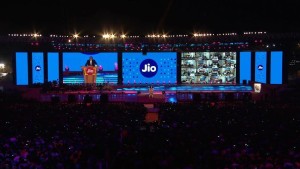 Reliance Jio Infocomm has 1,071 centres across the country with 35 in Mumbai alone. They will sell handsets as well as wireless services. The distribution network for handset and services are separate. Wireless services are 4x of Reliance centres, i.e. ~4,000 distributors whereas handsets are 40% of Reliance centres with 400 distributors.
Reliance Jio Infocomm has 1,071 centres across the country with 35 in Mumbai alone. They will sell handsets as well as wireless services. The distribution network for handset and services are separate. Wireless services are 4x of Reliance centres, i.e. ~4,000 distributors whereas handsets are 40% of Reliance centres with 400 distributors.
Jio management aims to Create a healthy handset ecosystem at an attractive price. Currently, RJIO has four series of handsets: Water, Earth, Lyf and Flame; each of them has four models. The handsets are priced in the range of INR 6,000-30,000. The handsets which will be commercially launched include only the Lyf series – four models – and 1-2 models of the Earth series. They will be available in the sub-premium category with an average selling price of INR 8,000 to INR 25,000.
The mass market handsets will be commercially launched closer to the wireless service launch. The mass market handsets are China-made from ZTE; others will be available in the range of INR 4,000- 5,000. Thus, any handset subsidy is ruled out. These handsets will be launched closer to the launch to ensure they do not help peers with a developed ecosystem for 4G.
Management is yet to disclose the price of the service offerings. RJIO plans to bundle mass handsets with wireless services, offering free handsets to users with a 6-12 month secured plans.
Meanwhile, extensive testing of the network across India continues. The degree of commercial success could depend on Jio’s ability to acquire 800 MHz in remaining circles (currently in 10 of 22) as indoor coverage of mobile network is very poor and pace of development of the handset ecosystem.